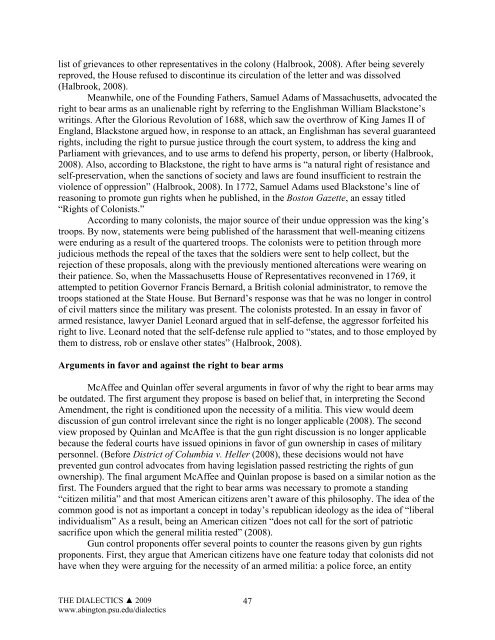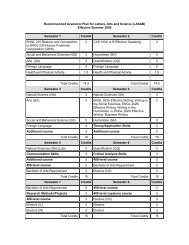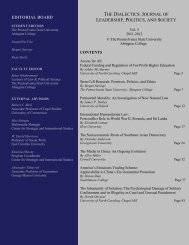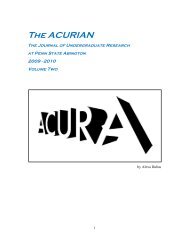Vol. III - Penn State Abington
Vol. III - Penn State Abington
Vol. III - Penn State Abington
You also want an ePaper? Increase the reach of your titles
YUMPU automatically turns print PDFs into web optimized ePapers that Google loves.
list of grievances to other representatives in the colony (Halbrook, 2008). After being severely<br />
reproved, the House refused to discontinue its circulation of the letter and was dissolved<br />
(Halbrook, 2008).<br />
Meanwhile, one of the Founding Fathers, Samuel Adams of Massachusetts, advocated the<br />
right to bear arms as an unalienable right by referring to the Englishman William Blackstone’s<br />
writings. After the Glorious Revolution of 1688, which saw the overthrow of King James II of<br />
England, Blackstone argued how, in response to an attack, an Englishman has several guaranteed<br />
rights, including the right to pursue justice through the court system, to address the king and<br />
Parliament with grievances, and to use arms to defend his property, person, or liberty (Halbrook,<br />
2008). Also, according to Blackstone, the right to have arms is “a natural right of resistance and<br />
self-preservation, when the sanctions of society and laws are found insufficient to restrain the<br />
violence of oppression” (Halbrook, 2008). In 1772, Samuel Adams used Blackstone’s line of<br />
reasoning to promote gun rights when he published, in the Boston Gazette, an essay titled<br />
“Rights of Colonists.”<br />
According to many colonists, the major source of their undue oppression was the king’s<br />
troops. By now, statements were being published of the harassment that well-meaning citizens<br />
were enduring as a result of the quartered troops. The colonists were to petition through more<br />
judicious methods the repeal of the taxes that the soldiers were sent to help collect, but the<br />
rejection of these proposals, along with the previously mentioned altercations were wearing on<br />
their patience. So, when the Massachusetts House of Representatives reconvened in 1769, it<br />
attempted to petition Governor Francis Bernard, a British colonial administrator, to remove the<br />
troops stationed at the <strong>State</strong> House. But Bernard’s response was that he was no longer in control<br />
of civil matters since the military was present. The colonists protested. In an essay in favor of<br />
armed resistance, lawyer Daniel Leonard argued that in self-defense, the aggressor forfeited his<br />
right to live. Leonard noted that the self-defense rule applied to “states, and to those employed by<br />
them to distress, rob or enslave other states” (Halbrook, 2008).<br />
Arguments in favor and against the right to bear arms<br />
McAffee and Quinlan offer several arguments in favor of why the right to bear arms may<br />
be outdated. The first argument they propose is based on belief that, in interpreting the Second<br />
Amendment, the right is conditioned upon the necessity of a militia. This view would deem<br />
discussion of gun control irrelevant since the right is no longer applicable (2008). The second<br />
view proposed by Quinlan and McAffee is that the gun right discussion is no longer applicable<br />
because the federal courts have issued opinions in favor of gun ownership in cases of military<br />
personnel. (Before District of Columbia v. Heller (2008), these decisions would not have<br />
prevented gun control advocates from having legislation passed restricting the rights of gun<br />
ownership). The final argument McAffee and Quinlan propose is based on a similar notion as the<br />
first. The Founders argued that the right to bear arms was necessary to promote a standing<br />
“citizen militia” and that most American citizens aren’t aware of this philosophy. The idea of the<br />
common good is not as important a concept in today’s republican ideology as the idea of “liberal<br />
individualism” As a result, being an American citizen “does not call for the sort of patriotic<br />
sacrifice upon which the general militia rested” (2008).<br />
Gun control proponents offer several points to counter the reasons given by gun rights<br />
proponents. First, they argue that American citizens have one feature today that colonists did not<br />
have when they were arguing for the necessity of an armed militia: a police force, an entity<br />
THE DIALECTICS ▲ 2009<br />
www.abington.psu.edu/dialectics<br />
47







